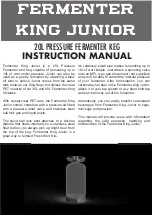
Instruction Manual for Mobile Jacks
14
5.4
Lifting, Lowering, and Transporting Loads
DANGER
Danger to life, risk of injury from lifted vehicles
Only load lift and load pick-up devices centrically by positioning the center of gravity in the
middle.
Safety Notes
Always keep the movement range of the lift free.
Keep the movement range of the load and the load pick-up devices free.
Complete lifting of vehicles with one or more lifts is not permitted.
Always shut down and secure the lift immediately in case of malfunction. Always have
malfunctions repaired immediately.
Do not operate the lift with compressed air containing condensate or dirt.
For work with strongly adhesive underbody sealants or lacquers, cover the piston rod.
Keep the piston rod and the pins of load pick-up devices free of sand and dirt.
Disconnect the lift from the compressed air supply at the end of work or before longer breaks.
Remove the removable pump rods after each work process.
CAUTION
Damage to lifts and vehicles from load pick-up devices and extended piston rods
Piston rods must always be completely retracted when entering or leaving workshop pits and
lifting platforms.
A sufficient distance must exist between load pick-up devices and vehicle.
Considerable longitudinal forces can occur when vehicle axles are lifted.
Disengage the handbrake and shift to idle, so that the wheels can roll.
Raising a vehicle
Lift the vehicle slightly with the lift at the load pick-up point.
Check for safe support and secure seating of the vehicle.
Lift the vehicle to the desired height.
Secure the vehicle against rolling off, for example with drag shoes.
Secure lifted vehicle with supporting bridges/A-frames.
Lowering the vehicle
Remove the roll-away protection from the vehicle.
Lift the vehicle slightly with the lift and remove the supporting bridges/A-frames.
Lower the vehicle slowly.
Retract the piston rod [1] completely and make sure that the support plate is on the piston rod.
Transporting vehicle parts
Position the vehicle part on a lift with a suitable transmission plate in centered position.
Secure the vehicle part with chains or belts.
Retract the piston rod [1] completely and transport the vehicle part.
Summary of Contents for Junior Jack 0
Page 2: ......
Page 20: ...Instruction Manual for Mobile Jacks 20 ...








































